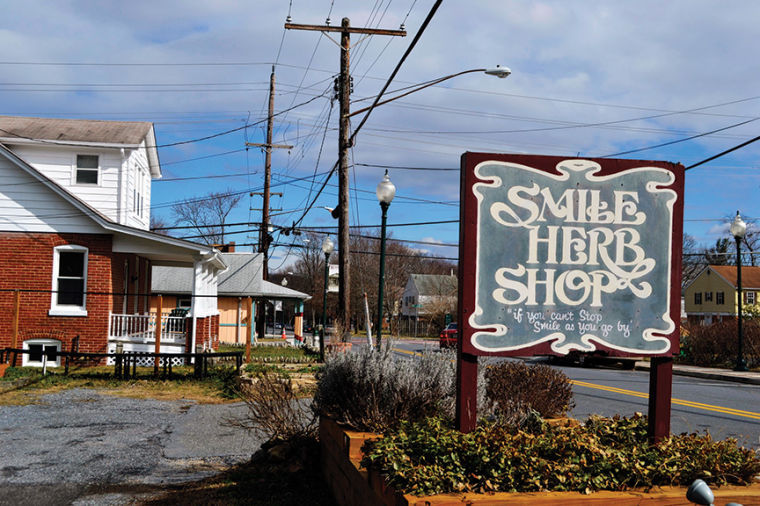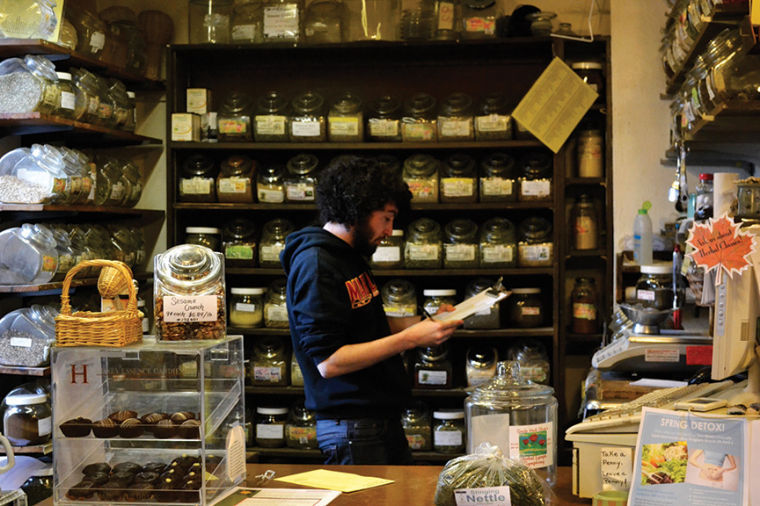Tucked away in a serene, storybook Berwyn neighborhood is an herbal sanctuary.
The light blue, two-story house conjures nostalgic memories of a childhood home rather than a shop of medicinal herbs. On the white porch, a rainbow of silky, pastel-colored scarves flutters in the wind. Inside, jars of spices and herbs, teas and suncatchers fill the dimly lit rooms floor to ceiling, and herbal candles wish customers good health, love, laughter and prosperity.
“Nettles are probably the best thing for allergies,” a middle-aged employee advises a woman musing over the selection. “Cinnamon is the best thing for diabetes.”
The woman thanks the man and smiles — a common sight in Smile Herb, the 38-year-old medicinal herb shop down the street from Fishnet on Berwyn Road. Over its long, rich history, the store its long, rich history, the store has grown into a thriving oasis of herbal medication based on Eastern philosophy, essential in a time of rising healthcare costs and inadequate mental health services, said Tom Wolfe, the store’s co-owner. But although some students frequent the shop, many don’t seem to know the place exists, Wolfe said.
In 1975, at 22 years old, Wolfe came to College Park looking for an old girlfriend and stumbled upon a tiny basement shop owned by a woman who called herself “Sweet Cicely,” after her favorite herb. Wolfe was suffering from a bad cough, and he asked the woman if she had anything that would help.
“[Doctors] would give me antibiotics and it would sort of go away, but then it would come back three months later,” Wolfe said. “She had me take a half gallon of yarrow tea, and I spit up all this bloody mucus, and it just went away and never came back.”
That was Wolfe’s first experience with herbal medication, and he was immediately captivated. But after he’d worked with Sweet Cicely for just six weeks, she took off to become a rock ‘n’ roll musician. For $200, he became the new owner of Smile Herb.
His parents thought it was just a phase: It was the 1970s, and alternative medications were often associated with drugs and radicalism.
“We were all flower children,” Wolfe said. “And then we became flower children that knew the botanical names.”
Although Wolfe said the culture of the time helped him experiment with a different lifestyle, he has seen the perception of his shop transform over the decades.
“Over 38 years, it went from, ‘Oh my God, there goes the neighborhood,’ to being respectable business people who have a product that helps people heal,” Wolfe said.
After a year, Wolfe and his wife and co-owner, Linda, moved their store to a house down the street — one originally home to the area’s first telephone exchange, which was dragged to its current spot by horses. It was most likely built in the late 1800s, Wolfe said.
To save money, the Wolfes lived on the floor above their shop. They sold coffee, teas and herbs, making about $80 a day. Slowly, they added vitamins and supplements, children’s toys and cosmetics. The business grew 12 percent a year for 24 straight years, Wolfe said. Smile Herb tries to remedy problems in a way Western medication can’t, because doctors often prescribe drugs that address symptoms rather than causes, Wolfe said.
Up a creaky purple staircase with banisters of chipping white paint, Wolfe sits with 53-year-old Sonia Francis in a small, incense-scented room. The two reach their arms up to the sky, cross them in front of their chests and then hold hands.
The exercise represents the three elements in the Eastern traditional medicine Ayurveda, Wolfe said: air, fire and water. Francis, who lives in Hyattsville, was receiving a free introduction to an Ayurveda class. The store also offers classes in professional herbalism.
Francis said she’s suffered from rheumatic fever since she was a child, but the insulin shots she takes don’t cure her condition.
The first time she went to Smile Herb, a worker convinced her to try herbal remedies.
“Before, I always thought the natural kind was not good because I thought they were like bush doctors,” Francis said. “But now that I’m growing older, I realize herbal medication is good for you.”
Francis, who works as a home nurse, said a lot of her patients have become frustrated with prescription medications and are now turning to herbs. At Smile Herb, one of the most popular remedies is hawthorn and garlic for high blood pressure.
Nestled far away from the retail culture of Route 1, Smile Herb doesn’t advertise widely to the university. But Wolfe said about 20 percent of its customer base consists of students, who often buy allergy and flu medications or energy-giving products during exam time.
But, he added, more students seem to be interested in “beer and pizza” than herbs.
“You think you’re immortal in college,” he said. “People don’t have health issues at 19, generally. But by the time you’re 35, half the people will be chronically ill. … It would be much better if people prevented it at your age.”
However, students frequently work at the shop. Jennifer Kuhlman, a 2005 graduate who worked at Smile Herb for about two years, said she decided to become a massage therapist after working there.
“I was never really sure what I wanted to be, and Smile gave me a little more direction,” Kuhlman said.
Now working in San Jose, Calif., Kuhlman said she still frequently drinks ginger tea to treat nausea and motion sickness.
George Bean, a cell biology and molecular genetics professor at the university, has been taking his medicinal and poisonous plants classes to Smile Herb for about a decade as an introduction to their study of “complementary” medications. In his class, students learn to analyze all types of medicine, he said.
“I think when people finish up the course, they’re much more informed,” Bean said. “They have to be aware there’s potential problems with these complementary medications, as there are with prescription drugs.”
But with the rising cost of healthcare, Wolfe said herbal medications are becoming more mainstream. And with the country’s concern over mental health services — especially in the aftermath of an off-campus murder-suicide by a student who reportedly suffered from mental illness — Wolfe said herbal remedies are worth a try.
“It’s absurd the way we treat mental health,” Wolfe said. “We’re over-drugging people who are sad.”
Instead, Wolfe said herbs, such as holy basil, can stabilize blood sugar and cortisol levels.
At Smile, health is treated holistically, merging the emotional, social and spiritual with the physical. A tribute on the door calls the shop a “safe haven” radiating “warm energy.” Even the sign outside spreads love to busy passersby: “If you can’t stop, smile as you go by.”
Kuhlman said Smile Herb is different from all of its neighborhood surroundings.
“I just really love alternative medication as an option,” she said. “I’d encourage people to go check the place out. … It’s almost kind of a magical little place tucked into the middle of things.”
Smile Herb, a 38-year-old medicinal herb shop on Berwyn Road, is based on Eastern philosophy and works to provide its customers with nontraditional remedies to various problems, said co-owner Tom Wolfe, who runs the store with his wife. At age 22, Wolfe started the shop when he came back to Berwyn.
The front counter at Smile Herb on Berwyn Road.




